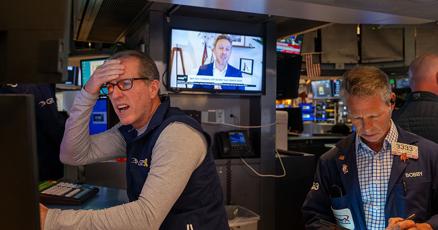
PITTSFIELD – For investors worrying about the plunging stock market, Allen Harris says there is probably more pain to come.
“There’s a 1,000 percent chance … the U.S. economy is going to go into a recession if these tariffs stay in place,” Harris said. “There’s a 90 percent chance the U.S. economy will go into a recession if they stay in place for about 30 days.”
Harris, CEO & Chief Investment Officer of Berkshire Money Management, is one of many financial advisers closely following the stock market. President Donald Trump’s recent tariffs have sparked a significant decline in stock markets around the world.
“I don’t think that Wall Street is correct in assuming that at some point Donald Trump is going to come in and save them,” investment adviser and Berkshire Eagle business columnist Bill Schmick said. “The other thing that I firmly believe is that this is not a blip in a bull market. I think that this is clearly a message of regime change.”
The scale at which Trump has proposed his tariffs is affecting the economy, and local investment advisers are expecting challenging times, telling clients to buckle up.
At the end of Monday, the Dow Jones Industrial Average was down 366.54 points, or 0.96 percent, to 37,948.32, in a volatile day of heavy trading. The tech-heavy NASDAQ rose 0.1 percent, or 15.48 points.
The Dow has lost 4,259.72 points since the market closed Wednesday, before Trump announced wide-ranging tariffs on U.S. trade partners.
The tariffs, assessed on other nations’ exported goods, are a part of the Trump administration’s game plan to maintain massive corporate tax cuts while reducing taxes even further. Tariffs are taxes on imported goods and services that are imposed by a government.
“The three-day decline that we’ve had was the worst since World War Ⅱ,” Schmick said. “[It’s] similar to the great financial crisis and worse than the COVID decline.”
The crash has many people concerned over their finances. Schmick says people who are living off retirement savings accounts should be concerned because they can’t afford to lose 20 or 35 percent of those savings.
According to CNN, if a bear market – a sustained 20 percent drop – takes hold, it would be the earliest in a new presidential administration that a bull market – an extended 20 percent increase – turned into a bear in the history of the S&P 500.
The lack of a response from other trading partners such as Japan or Korea is a concern for investors, Schmick said. That and the lack of information is challenging for the markets.
“Markets unfortunately can’t stand the lack of information,” Schmick said. “They can deal with the good and the bad … But they hate uncertainty.”
Schmick said the markets have been “wild,” on Monday and that it’s not a great time for people to venture into the market. Schmick notes that the speed with which the market is changing is “way beyond any person’s ability to make investment decisions.”
Harris says it’s important to look at the tariffs and the uncertainty rippling through the business community to determine if the decline will reverse or continue. Harris is not shorting the market – betting with his portfolio that the market will decline – because Trump can pause or remove the tariffs.
“It makes it really difficult to short the market or go to complete cash,” Harris admitted. “One tweet [on X] can just make the market go right back up again.”
Harris believes it’s the erratic policymaking that has frozen businesses and consumers. However, he still sees people buying.
“People have been conditioned to buy on the market and see these more as opportunities as opposed to running and hiding,” Harris said. “That’s not to say that people aren’t concerned. They are because a 20 percent pullback can quickly become a 35 percent pullback when there is a recession.”
Schmick thinks there could be a “bounce up” by the second half of April. Although Schmick doesn’t think the market will hit record highs, he feels there will be a small bounce, but the economy and earnings will slow.
“I think that what will end up happening is sometime in May, June, or July, the Federal Reserve Bank will begin cutting interest rates because the economy is slowing and unemployment is increasing,” Schmick said. “Then I think that the market could rally even more.”
With tough times looming, Harris says it’s not a bad idea to take some profits and some losses. Harris and his team have recently started doing some tax block selling to take advantage of some losses, which can be used as a tax deduction later on.
When asked to predict how the stock market will look in a few months, Harris said investors should prepare for all outcomes.
“If it takes them longer than 30 days to do so. … This is major,” Harris said. “This will cause a major recession if the tariffs remain on.”
[Collection]berkshireeagle.com